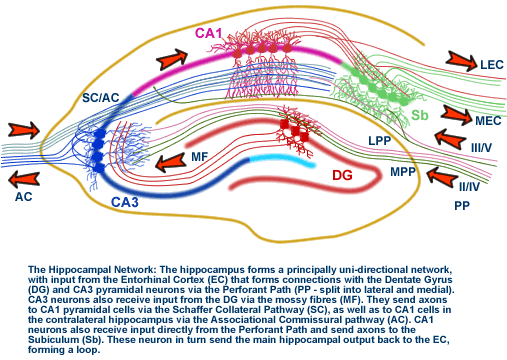We've all had the feeling we've been somewhere before or had a feeling we've previously had a conversation. It isn't magic or mysticism, the answer is in a set of neurons called your 'place cells.'
Researchers believe these 'place cells' fire to provide a sort of blueprint for any new space we encounter. The next time we see the space, those same neurons fire. Thus we know when we've been somewhere before and don't have to relearn our way around familiar turf. But similar spaces may activate overlapping neuronal blueprints, leaving room for confusion if the neurons are not fine-tuned. Thus happens deja vu.

Forming memories of places and contexts in which episodes occur engages a part of the brain called the hippocampus. Each of the three hippocampal subregions-the dentate gyrus, CA1 and CA3-contribute uniquely to different aspects of learning and memory. In their current study, co-authors Susumu Tonegawa, Matthew Jones and Dr Thomas McHugh have revealed that the learning in the dentate gyrus is crucial in rapidly recognizing and amplifying the small differences that make each place unique.
Dr. Jones, commenting on the paper, said: "We constantly make split-second decisions about how best to behave at a given place and time. To achieve this, our nervous system must employ highly efficient ways of rapidly recognising and learning important changes in our environment.
"This paper demonstrates that a particular protein signalling molecule (the NMDA receptor) in a particular network of brain neurons (the dentate granule cells of the hippocampus) is essential for these rapid discrimination processes, hopefully paving the way for therapies targeting learning and behavioural disorders."
In this study, the researchers used a line of genetically altered mice to pinpoint how the dentate gyrus contributes to the kind of pattern separation involved in identifying new and old spaces. Whilst the mice behaved normally in most situations, they became confused when required to discriminate between different spaces. This may model the difficulties in forming distinct memories for similar but distinct places and experiences that afflicts some elderly individuals.
In addition to Dr. Matthew Jones, Professor Susumu Tonegawa and Dr. Thomas McHugh, authors include Matthew Wilson, Picower Scholar and Professor; and colleagues from the University of California at Los Angeles and Beth Israel Deaconess Medical Center in Boston.
Source: University of Bristol






Comments